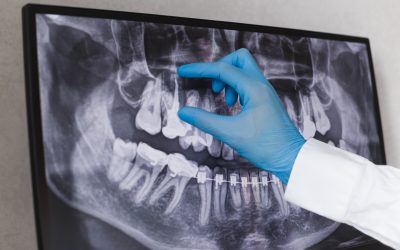Dental implants have emerged as a popular solution for individuals who have lost their natural teeth for various reasons, such as accidents, tooth decay, or gum disease. These artificial tooth roots provide a sturdy base for replacement teeth (both fixed and removable) that are custom-made to resemble the appearance and function of natural teeth. While dental implants offer several advantages, being aware of their potential drawbacks is also essential. So, what are the pros and cons of dental implants?
Understanding Dental Implants
Dental implants are a common answer for those who have lost one or more teeth. They consist of metal, screw-like posts that are embedded into the jawbone, acting as an artificial tooth root and supporting a dental prosthesis such as a crown, bridge, or denture. Dental implants aim to provide a more permanent, natural-looking, and functional alternative to traditional tooth replacement methods.
The ability of dental implants to closely mimic the look, feel, and function of natural teeth is one of the main advantages. This can lead to improved speech, increased comfort, and better overall oral health for the patient. Furthermore, dental implants offer a level of durability that is often unmatched by other tooth replacement options.
Dental implants not only provide cosmetic and functional benefits but can also contribute to maintaining a healthy jawbone structure. When a tooth is lost, the lack of proper stimulation can lead to jawbone loss. Implants work by fusing with the bone through a process called osseointegration, which can promote bone growth and prevent additional deterioration of the jawbone.
Benefits of Dental Implants
Dental implants provide a range of benefits, including improved overall oral health, comfort and function, and natural appearance.
Improved Oral Health
Dental implants offer significant benefits for one's oral health. Alternate to other tooth replacement options, such as bridges, dental implants do not mandate that neighboring teeth be reduced. This helps preserve the natural tooth structure and promotes better long-term oral health. Additionally, dental implants stimulate bone growth in the jaw, preventing bone loss and preserving the jawbone structure. This can also lead to improved overall oral hygiene.
Comfort and Durability
One major advantage of dental implants is their comfort and durability. Because dental implants are designed to fuse with the bone, they provide a strong and stable support for the artificial tooth, ensuring a more comfortable fit. This is in contrast to dentures, which can sometimes slip or cause discomfort. Dental implants also function just like regular teeth, allowing individuals to chew effectively and speak clearly without any issues. Furthermore, if taken care of properly, dental implants can last for many years or even a lifetime, making them a long-lasting solution for tooth replacement.
Enhanced Aesthetics
Finally, dental implants offer a natural and appealing appearance. They are designed to look and feel like one's own teeth, resulting in a more aesthetically pleasing smile. Since dental implants fuse with the bone, they remain securely in place, ensuring a natural look and improved confidence. With dental implants, individuals can enjoy a seamless integration of the artificial tooth with their natural teeth, enhancing their overall appearance.

Drawbacks of Dental Implants
With all the benefits dental implants provide, they also come with potential risks that patients should carefully consider when evaluating what are the pros and cons of dental implants.
Surgical Risks
As mentioned, dental implants must be embedded into the jawbone to support a replacement tooth. This surgical procedure is like any surgery that comes with potential risks, such as pain, swelling, and bleeding at the site of the implant. In some cases, patients may experience complications from anesthesia, including nausea, vomiting, and drowsiness. Additionally, implants may lead to infections or damage surrounding teeth and nerves if not properly placed.
Cost Implications
Another significant drawback of dental implants is their cost. The procedure can be quite expensive, and insurance providers may not always cover the full cost of treatment. Costs for dental implants typically vary depending on implant type, the materials used, and the complexity of the procedure. Supplemental procedures, such as a bone graft, may be necessary, increasing the overall cost.
It's essential for patients considering dental implants to consult with their dentist and insurance provider to determine the potential expenses and explore alternative treatment options if the cost is prohibitive.
Maintenance Requirements
While dental implants are designed to act and look like natural teeth, they still require proper care and maintenance to ensure their longevity. Regular dental checkups are necessary for monitoring the health of the implant and surrounding tissue. Furthermore, practicing good oral hygiene habits—such as brushing, flossing, and using mouthwash—helps prevent any possible complications, such as gum inflammation or infection.
Additionally, dental implants may sometimes require adjustments or repairs over time, which can also contribute to the overall costs associated with this dental treatment.
The Procedure for Dental Implants
The surgical procedure of dental implants is usually a multi-step process. The full process could take many months to complete.
Consultation and Planning
During the initial consultation, the dentist evaluates the patient's oral health and determines whether dental implants are suitable. This assessment includes examining the patient's jawbone, gums, and the overall health of their remaining teeth. Imaging, like X-rays and CT scans, are usually conducted to assess the bone density and structure. A treatment plan is tailored based on the individual's requirements, which takes into account the number of teeth to be replaced and the type of implant to be used.
Implant Placement
In this stage, the dentist makes an incision in the gum to uncover the underlying bone. A small hole is drilled into the jawbone, and the screw-like dental implant is placed. The implant is made of a biocompatible material like titanium, allowing it to fuse with the bone over time. This process, known as osseointegration, usually takes a few months and helps to create a strong foundation for the artificial tooth.
Prosthetic Attachment
Once the implant has successfully integrated with the jawbone, a small connector called an abutment is attached to the implant. To match the patient's natural teeth, a custom dental crown is attached to the abutment. The final result is a fully functioning and natural-looking artificial tooth. Overall, dental implant surgery is a highly effective solution for individuals with missing or severely damaged teeth.
Aftercare for Dental Implants
Proper aftercare of post-dental implant surgery is crucial to ensure the implants become a long-lasting success. This section will discuss the initial recovery process and the long-term care required to maintain dental implants.
Initial Recovery
The first few days post-dental implant surgery are crucial for successful healing. It's important to follow these guidelines:
-
- Control bleeding: Bleeding from the implant site or redness in the saliva can continue for up to 72 hours. Biting down on gauze for about an hour and repeating every 6-10 hours as necessary can help control bleeding.
- Manage swelling and pain: Applying an ice pack or cold compress to the face near the implant site can reduce swelling. Over-the-counter pain medication is usually sufficient for managing discomfort.
- Avoid strenuous activities: Rest for at least 48 hours after surgery, and avoid any activities that could increase blood pressure and cause complications.
- Maintain oral hygiene: Clean your mouth by gently rinsing with a saltwater solution and brushing your teeth carefully to avoid disturbing the implant site.

Long-Term Care
After the initial recovery, regular dental implant care is essential to prevent complications and ensure long-term success. Here are some tips for maintaining your dental implants:
-
- Brush and floss daily: Just like your natural teeth, it's essential to brush twice a day and floss daily to prevent plaque buildup and the development of gum disease.
- Regular dental checkups: Visit your dentist for regular checkups and professional cleanings every six months to maintain your implant's health and monitor for any potential issues.
- Avoid harmful habits: Limit hard foods that may damage the implant, and avoid using your teeth as tools to open or cut objects. Refrain from smoking, as it can increase the risk of implant failure.
What are the Pros and Cons of Dental Implants Wrap-Up
Dental implants can successfully replace lost or damaged teeth, offering many advantages over alternatives such as dentures or bridges. They are created to function like natural teeth and can improve oral health by preserving jawbone strength and preventing bone loss. Permanence is one of the main benefits of dental implants, since they are designed to last a lifetime when properly cared for.
However, not everyone is suited for dental implants, as they can be more expensive than alternative treatments. The procedure also requires surgery with multiple appointments, which could be lengthy depending on the patient's oral health. Furthermore, there is a risk of complications such as infection or rejection of the implant, though these risks are relatively low.
In conclusion, dental implants can significantly improve a person's quality of life by providing a functional and aesthetically pleasing solution for tooth replacement. It is important for those individuals considering this treatment to understand what are the pros and cons of dental implants. Then, before deciding, speaking with a qualified dental professional is suggested so you can better understand if dental implants are the right option for you.
Frequently Asked Questions
What is the success rate of dental implant treatment?
Dental implant treatments have a relatively high success rate. On average, they are successful in about 95% of cases. However, this success rate can change depending on factors such as the patient's oral health, the skill of the dental professional, and the quality of the implant materials used.
Can dental implants cause any health risks to patients?
Dental implants are generally regarded to be safe and effective. However, complications can occur, as with any medical procedure. Some potential risks associated with dental implants include infection, nerve damage, and sinus issues. Choosing a knowledgeable and experienced dental professional can help minimize these risks.
How does the cost of dental implants compare to alternative treatments?
Dental implants can be a more expensive alternative to other treatments, for example, dentures or dental bridges. However, the long-term benefits of dental implants often make them a worthwhile investment. They provide a more natural look and feel, and with appropriate care, they can last for one's lifetime.
What is the long-term durability of dental implants?
Made of high-quality titanium, dental implants can endure for decades or even a lifetime. Maintaining good long-term oral care with proper hygiene and regular dental checkups is essential to ensure the ongoing health of your dental implants.
How does the recovery process differ between dental implants and other options?
The recovery process following dental implant surgery can be more involved than with alternative treatments. Some discomfort and swelling in the days following the procedure are normal. However, it can take several months for the implant to integrate with the jawbone fully. In comparison, recovery from dentures or dental bridges is generally quicker, with a shorter healing time.
What are the main factors affecting the longevity and success of dental implants?
Several factors can impact the success and longevity of dental implants. These include the patient's overall health, the quality of the implant materials used, the skill of the dental professional, and the patient's oral hygiene habits. Keeping up with good oral health and attending regular dental checkups can significantly contribute to the long-term success of dental implants.




